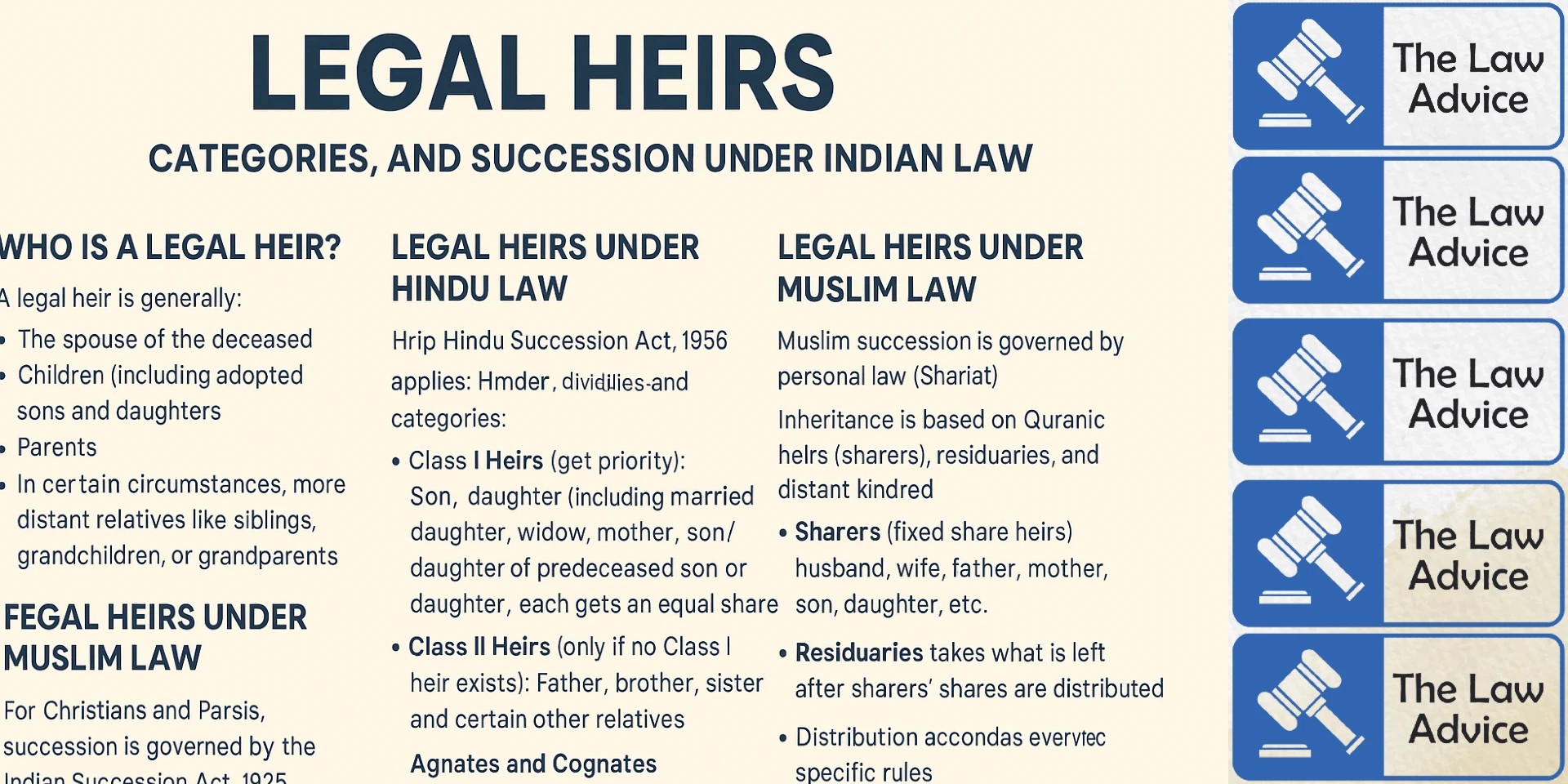Legal Heirs: Rights, Categories, and Succession
The concept of legal heirs is central to succession law in India. A legal heir is a person who is entitled by law to inherit the property, rights, or obligations of a deceased person. In simple terms, when a person dies without leaving a will (intestate), their estate passes on to their legal heirs. The determination of legal heirs is governed by personal laws, such as the Hindu Succession Act, 1956, Indian Succession Act, 1925, and Muslim Personal Law (Shariat) Application Act, 1937, depending on the religion of the deceased.
Who is a Legal Heir?
A legal heir is generally:
- The spouse of the deceased,
- The children (sons and daughters, including adopted),
- The parents,
- And in certain circumstances, more distant relatives like siblings, grandchildren, or grandparents.
However, the categorization and order of succession vary under different personal laws.
Legal Heirs under Hindu Law
For Hindus, Buddhists, Jains, and Sikhs, the Hindu Succession Act, 1956 applies. The Act divides heirs into categories:
- Class I Heirs (get priority):
- Son, daughter (including married daughter), widow, mother, son/daughter of predeceased son or daughter, etc.
- Each gets an equal share.
- Class II Heirs (only if no Class I heir exists):
- Father, brother, sister, and certain other relatives.
- Agnates and Cognates:
- If no Class I or II heirs exist, then relatives connected through male (agnates) or female (cognates) lineage inherit.
Legal Heirs under Muslim Law
Muslim succession is governed by personal law (Shariat). Inheritance is based on the Quranic heirs (sharers), residuaries, and distant kindred.
- Sharers (fixed share heirs): include husband, wife, father, mother, son, daughter, etc.
- Residuaries: take what is left after sharers’ shares are distributed.
- Distribution is made according to specific rules; daughters usually receive half the share of sons, but wives, parents, and children are always included.
Legal Heirs under Christian and Parsi Law
For Christians and Parsis, succession is governed by the Indian Succession Act, 1925.
- The spouse, children, and parents are the primary heirs.
- Property is usually divided equally among the widow/widower and children.
- If no immediate family exists, then siblings and extended relatives may inherit.
Rights of Legal Heirs
Legal heirs have several rights, such as:
- Right to Inheritance – Equal or proportionate share in the property of the deceased.
- Right to Maintenance – Certain heirs (like parents, spouse, and children) can claim maintenance out of the estate.
- Right to Challenge a Will – If a will excludes rightful heirs unfairly, they may contest it on grounds of fraud, coercion, or incapacity.
- Right to Partition – Heirs can seek division of ancestral or inherited property.
Procedure to Establish Legal Heirship
In practice, to claim inheritance or benefits (like pension, insurance, bank deposits), heirs may need a Legal Heir Certificate or Succession Certificate.
- Legal Heir Certificate: Issued by local revenue authorities (Tehsildar/municipality), used to claim family pension, employment benefits, or transfer of utilities.
- Succession Certificate: Issued by a civil court, mainly required to claim debts, securities, or movable property of the deceased.
Landmark Case Laws on Legal Heirs in India
1. Gurupad Khandappa Magdum v. Hirabai Khandappa Magdum (1978) 3 SCC 383: The Supreme Court held that when a male Hindu dies intestate, the notional partition concept applies, and the widow is entitled to a share equal to that of a son.
2. Vineeta Sharma v. Rakesh Sharma (2020) 9 SCC 1: In this case the Court clarified that a daughter has equal coparcenary rights in ancestral property under the Hindu Succession (Amendment) Act, 2005, irrespective of whether the father was alive on the date of the amendment.
3. Danamma @ Suman Surpur v. Amar (2018) 3 SCC 343: Daughters are entitled to inherit as coparceners even if the father died before the 2005 amendment, provided the suit for partition was pending.
4. Commissioner of Wealth Tax v. Chander Sen (1986 AIR 1753): The Supreme Court held that property inherited by a son from his father under the Hindu Succession Act will be treated as the son’s separate property, not as Hindu Undivided Family (HUF) property.
5. Mohd. Ahmed Khan v. Shah Bano Begum (1985 AIR 945): Though primarily a case on maintenance, it recognized the rights of a divorced Muslim woman to claim maintenance, thereby highlighting the intersection of inheritance, maintenance, and family law under personal laws. This demonstrates that heirs’ rights cannot be interpreted in isolation from maintenance obligations.
6. Mary Roy v. State of Kerala (1986 AIR 1011) : The Supreme Court held that Christian women in Kerala are entitled to equal rights of inheritance under the Indian Succession Act, 1925, invalidating discriminatory provisions of the Travancore Christian Succession Act. This is a landmark judgment in securing gender equality for Christian women in inheritance.
7. Githa Hariharan v. Reserve Bank of India (1999) 2 SCC 228: While primarily about guardianship, the Court observed that women (widows/mothers) have equal legal status as heirs and guardians, ensuring a gender-just interpretation of succession.
Importance of Knowing Legal Heirs
- Prevents family disputes and litigation over property.
- Ensures smooth transfer of property and assets.
- Helps in financial claims like insurance, PF, gratuity, and bank accounts.
- Upholds social justice, especially for widows, daughters, and dependent parents.
Conclusion
The law of succession seeks to balance family obligations with fairness in property distribution. Understanding the concept of legal heirs is essential not only for lawyers but also for common citizens, as disputes in families often arise due to lack of clarity. While personal laws differ, the underlying principle remains that the closest relatives of the deceased deserve the first right to inherit.

